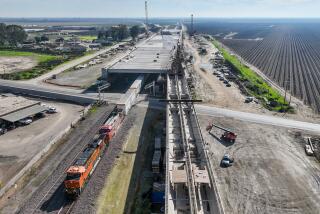California bullet train groundbreaking faces new obstacles
- Share via
California’s bullet train agency is facing a series of new regulatory and political problems that could jeopardize its July construction kickoff, which already has been delayed more than six months.
The new challenges are coming from a private railroad that controls a key right of way, a legislative committee delving into contracting issues and a powerful federal agency asserting authority over the project.
The rail agency is beginning to make purchase offers for land around Fresno and says it still plans to start building this summer.
But last week, Burlington Northern Santa Fe Railway Co., which operates a freight line that follows some of the 130-mile initial route in the Central Valley, warned in a blunt letter that no deal has been reached to build on or near its existing track. The company also signaled that it may not be willing to accept the project as proposed, in part because the exact route of the line is still unclear.
BNSF had been seen as one of the more accommodating organizations to the project. But the letter, addressed to the rail authority’s main consultant, Parsons Brinckerhoff, and copied to the rail authority, asserts that the rail agency’s planning process has “a great deal of ambiguity and contradictions.” The agency is sending mixed messages to different government agencies about what the construction entails, and it’s not clear who has the authority to speak and negotiate for the state, the railroad claimed.
The letter also raises concerns about the safety of future bullet train operations and construction work next to its freight corridor through the Central Valley.
If BNSF balks at finalizing a deal, it could put a roadblock in front of the project. Federal grants to the project contain language that requires the project to have necessary agreements with railroads before starting construction. A BNSF spokeswoman said the company would not elaborate on the letter.
A rail authority spokesman downplayed the BNSF letter, saying it is “not a show stopper.”
But the issues in the letter parallel those raised by Rep. Jeff Denham (R-Atwater), chairman of the House rail subcommittee, who said he will conduct a hearing on the project May 28.
“We want to know what routes they are choosing and the timeline on the project,” he said.
Separately, the rail agency is coming under new scrutiny from the state Senate Transportation Committee, which is looking into the bid evaluation process for the first 29-mile segment of rail bed through Fresno. The authority’s staff changed its bid evaluation criteria last year, after the agency’s board initially set up a two-step process that would have thrown out contracting teams with the two lowest technical scores.
The board gave the agency staff permission to make non-substantive changes to a so-called term-sheet that spells out detailed contract terms. But the bid evaluation process was not among the items on the term sheet, records show, raising questions about whether the changes were authorized. Officials have not yet explained how the decision to change the review process was made.
“The committee has some concerns and we are going to look into it,” said Sen. Mark DeSaulnier (D-Concord), the transportation committee chairman.
When the bids were announced this month, a construction team led by Tutor Perini Corp. of Sylmar had the lowest technical score, but was ranked highest because of its relatively low price of just under $1 billion.
The authority has defended the bid review change, saying it was designed “to increase transparency and gain greater value for the project.” The rules were not altered to favor Tutor Perini, which has a long history of government contracting in California, officials said. Tutor Perini officials did not respond to a request for comment.
The rail agency said the altered bid review process may have helped save the state hundreds of millions of dollars.
But Elizabeth Alexis, a co-founder of the watchdog group Californians Advocating Responsible Rail Design, argued that the bid review process ultimately used was not properly authorized and that the Tutor Perini team’s selection should be invalidated.
Alexis and other critics are concerned that the authority is trying to reduce upfront cost estimates at the risk of a lower-quality project or future increases in outlays to complete the system.
Elsewhere, the bullet train agency this month failed in its attempt to keep the federal Surface Transportation Board from asserting legal jurisdiction over the project.
The state now is seeking expedited consideration of an exemption from the federal board’s review for the first construction segment, a process that could take as long as nine months under federal law. If the agency decides to conduct a full examination of the multibillion-dollar project, it could cover a range of design, financial and operational issues, and add another layer of government bureaucracy to the endeavor.
More to Read
Sign up for Essential California
The most important California stories and recommendations in your inbox every morning.
You may occasionally receive promotional content from the Los Angeles Times.












